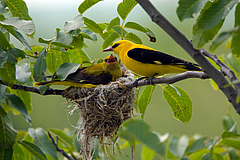Green Shoots for rewilding

Central Apennines rewilding area, Italy (Photo: Sandra Bartocha / Wild Wonders of Europe / Rewilding Europe).

Golden oriole male and female (Oriolus oriolus) at their nest, Natural Park Persina, Nikopol, Bulgaria (Photo: Dietmar Nill / Wild Wonders of Europe / Rewilding Europe).
Note for the media: Use of the pictures provided by iDiv is permitted for reports related to this media release only, and under the condition that credit is given to the picture originator.
Habitat loss is a major barrier to biodiversity conservation in the EU and to achieving the goals of the Birds and Habitats Directives and the Water Framework Directive. Restoring and maintaining large and interconnected areas of high quality habitat such as wetlands and floodplains is therefore of utmost importance for the conservation of nature in Europe in the years to come.
Implementing both the Habitats Directive and the Birds Directive, and achieving a good ecological status of waters under the Water Framework Directive, will require large-scale ecological restoration in the EU. However, progress so far has been disappointing: none of the 28 EU Member States has presented an adequate plan to restore 15% of their degraded ecosystems, in spite of their commitment under the EU Biodiversity Strategy to develop such plans.
The initiative aims to demonstrate that rewilding principles provide an effective means to support a coherent and functional ecological network in Europe, thereby strengthening the EU restoration agenda. It will promote the acceptance of rewilding principles in the political debate and strive to see their inclusion in the follow-up of the 2020 EU Biodiversity Strategy. The role of iDiv will be to conduct research on rewilding in order to reinforce the evidence for the effectiveness of this approach in nature conservation. Postdoctoral researcher Néstor Fernández and Professor Henrique Pereira (both Department of Biodiversity Conservation, iDiv/MLU) will be involved in this project.
In this initiative, “rewilding” is presented as a multifaceted concept with three broad, interrelated dimensions: 1) restoring and giving space to natural processes, 2) reconnecting wild(er) nature with the modern economy, and 3) responding to and shaping of cosmopolitan perceptions of nature conservation among the European society.
Furthermore, rewilding can represent a more cost-efficient approach to ecosystem restoration compared to conservation approaches that require intensive management. The goal is to restore dynamic and self-sustaining ecosystems and, where appropriate, stimulate new enterprise and economic activity, for example nature-friendly tourism. This opens up the prospect of significantly reducing recurrent management costs, and the opportunity to raise new investment and income streams, thus creating new incentives for stakeholders and local communities to value their natural capital and to support conservation.
Gui-Xi Young (BirdLife Europe & Central Asia)Further Information:Dr Néstor Fernández (English and Spanish)
Postdoctoral researcher at the Department for Biological Conservation at the German Centre for Integrative Biodiversity Research (iDiv) Halle-Jena-Leipzigand the Martin Luther University of Halle-Wittenberg
Web:
www.idiv.de/de/das_zentrum/mitarbeiterinnen/mitarbeiterdetails/eshow/fernandez-nestor.html

